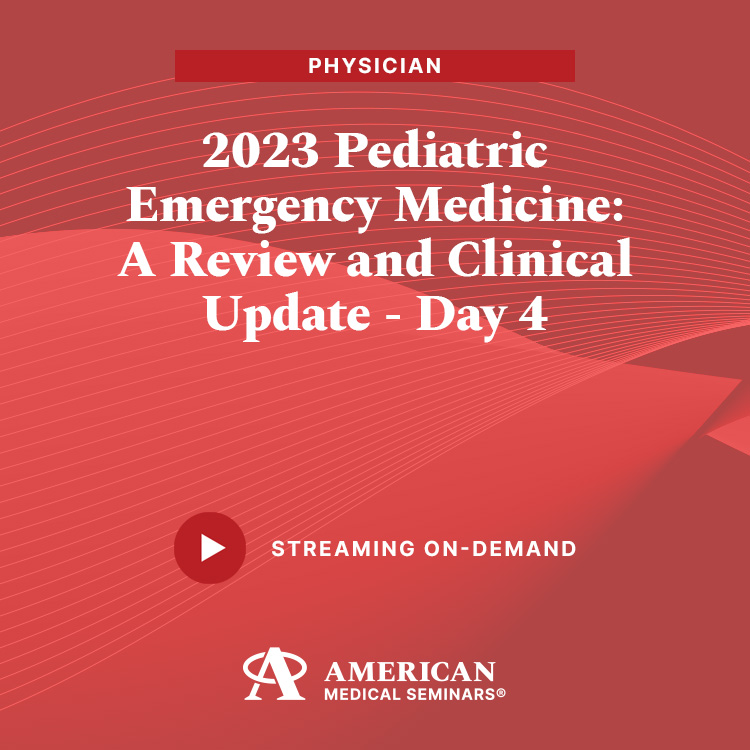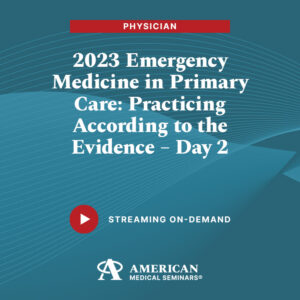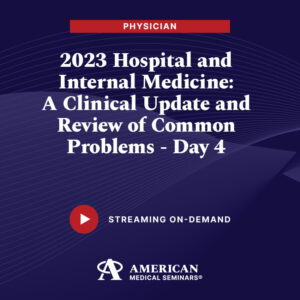Title: Pediatric Emergency Medicine: A Review and Clinical Update – Day 4 (Physician)
Faculty: John Loiselle, M.D., F.A.A.P.; Rakesh Mistry, M.D., M.S.; Richard Scarfone, M.D., F.A.A.P.
Release Date: 7/1/2023 Expiration Date: 7/1/2026
Day 4
Antimicrobial Stewardship Approaches for Common Outpatient Infections
Upon completion of this session, the participant should be able to: GL, COMP
- Outline the principles of antimicrobial stewardship as they relate to outpatient emergency department infections.
- Recognize the most effective approaches to promoting antimicrobial stewardship in the outpatient setting.
- Develop antibiotic treatment strategies for outpatient emergency department infections consistent with antimicrobial stewardship principles and guidelines.
Skin and Soft Tissue Infections in the Era of Community-Associated Methicillin-Resistant Staphylococcus aureus (CA-MRSA): An Evidence-Based Approach
Upon completion of this session, the participant should be able to: EBM, GL, COMP
- Detect common skin and soft tissue infections potentially caused by CA-MRSA in children.
- Construct a diagnostic approach to common CA-MRSA infections using the most recent pediatric evidence and national guidelines.
- Use recent evidence to develop appropriate management strategies for CA-MRSA infections.
- Construct an informed approach to antibiotic therapy for skin and soft tissue infections.
Pain Management in the Office and ED
Upon completion of this session, the participant should be able to: EBM, GL, COMP
- Employ the American Society of Anesthesiologists, American Academy of Pediatrics, and American College of Emergency Physicians fasting guidelines for procedural sedation.
- Manage the pain associated with specific illnesses or injuries commonly seen in an office setting.
- Manage the pain and sedation needs of children with specific illnesses or injuries commonly seen in an ED.
Evaluation and Management of Dehydration in Children
Upon completion of this session, the participant should be able to: EBM, COMP
- Determine the degree of dehydration in children using common clinical findings.
- Relate appropriate indications for laboratory evaluation and intravenous fluid therapy for dehydrated children.
- Describe the various methods of rehydration for children.
- Utilize current evidence to understand the role of anti-emetics and oral rehydration therapy in the treatment of children with dehydration.
No Time to Waste – Surgical Emergencies
Upon completion of this session, using information from review articles, the participant should be able to: EBM, COMP
- Based on a child’s presenting signs and symptoms suggestive of a surgical emergency, make rapid management decisions based upon referenced Evidence-Based Medicine and validated clinical prediction rules.
- Administer appropriate diagnostic studies in the evaluation of children with surgical emergencies.
- Avoid activities that will result in a delayed diagnosis for children with surgical emergencies.
- The receipt for any incentive-associated purchase will designate the value of the gift card separately from the cost of the learning activity.
- This incentive may have implications on your tax reporting obligations. Any reimbursed amount must be declared as personal income for tax purposes.



